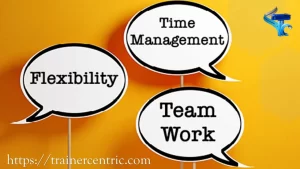Soft skills training, often referred to as interpersonal or people skills, are becoming increasingly essential in today’s workplace. While technical skills are undoubtedly crucial, it’s the soft skills training that truly set employees and organisations apart.
In this article, we’ll delve into the numerous advantages of incorporating soft skills training into the workplace, exploring how they contribute to individual growth, team dynamics, and overall organisational success.

So, What is Soft Skills Training?
Soft skills training refers to a structured and intentional process aimed at developing and enhancing the interpersonal qualities and attributes that contribute to effective communication, collaboration, and personal growth.
Unlike technical skills that are specific to certain tasks, soft skills are transferable across various contexts and play a pivotal role in navigating the complexities of the modern workplace.
Objective of Soft Skills Training

The primary objective of soft skills training is to equip individuals with the tools and knowledge needed to excel in areas beyond technical expertise. This training aims to foster qualities such as communication, problem-solving, adaptability, teamwork, leadership, emotional intelligence, and time management.
By enhancing these skills, individuals can enhance their professional relationships, productivity, and overall career trajectory.
Components of Soft Skills Training
- Awareness and Self-Assessment: Soft skills training often begins with introspection. Individuals assess their existing skill set, identify areas for improvement, and set personal development goals.
- Interactive Workshops: Workshops and interactive sessions are common formats for soft skills training. These sessions provide participants with practical techniques and strategies for improving communication, collaboration, and other critical skills.
- Role-Playing and Simulations: Simulations and role-playing exercises enable participants to practice real-world scenarios in a controlled environment. This helps build confidence in applying newly acquired skills.
- Feedback and Reflection: Constructive feedback is an essential component of soft skills training. Participants receive insights on their strengths and areas for improvement, enabling them to refine their skills over time.
- Continuous Learning: Soft skills are not developed overnight; they require ongoing learning and practice. Training programs often encourage participants to integrate their new skills into their daily interactions and seek further development opportunities.
The Importance of Soft Skills Training in the Workplace
Soft skills hold a significant role in shaping the dynamics of today’s modern workplace. While technical skills and qualifications undoubtedly have their place, it’s the soft skills that often make the crucial difference in fostering effective communication, collaboration, and overall professional success.
Enhanced Communication
At the heart of every successful organisation lies effective communication. Soft skills empower employees to express themselves clearly, actively listen to others, and convey complex ideas in a manner that’s easily understandable. This ability to communicate concisely and empathetically minimises misunderstandings, streamlines processes, and creates a more harmonious work environment.
Effective Teamwork

In a world where cross-functional teams are the norm, the importance of effective teamwork cannot be overstated. Soft skills training play a pivotal role in building strong team dynamics. Individuals who possess these skills can collaborate seamlessly, appreciate diverse perspectives, and contribute constructively to group projects. This synergy not only enhances productivity but also cultivates an atmosphere of innovation and creativity.
Problem-Solving Abilities
Soft skills play a crucial role in enhancing problem-solving abilities. When we possess strong soft skills, such as communication, teamwork, empathy, and adaptability, we approach problem-solving in a more effective and collaborative manner. Clear communication ensures that everyone understands the problem at hand, while empathy helps us consider various perspectives and understand the root causes of issues. Teamwork allows us to pool diverse ideas and skills, leading to innovative solutions. Adaptability enables us to remain open to new approaches when old ones don’t work. Overall, soft skills create a foundation for a supportive and creative problem-solving environment, leading to better outcomes and stronger relationships among team members.
Adaptability and Flexibility
In an era of rapid technological advancements and market fluctuations, adaptability and flexibility are no longer optional traits for employees. Soft skills training in this realm enable individuals to embrace change, remain open to new ideas, and navigate uncertainties with resilience. This adaptability ensures that the organisation remains agile and capable of evolving to meet new demands.
Leadership and Management

Soft skills training extend beyond individual contributors to include those in leadership roles. Leadership isn’t solely about hierarchical positions; it’s about inspiring and guiding others. Developing soft skills such as motivating team members, resolving conflicts, and delegating tasks enhances an individual’s ability to lead effectively, even if they’re not in a traditional managerial role.
Key Soft Skills for Professional Development
- Communication Skills
- Problem-Solving Abilities
- Emotional Intelligence
- Stress Management
- Collaboration and Teamwork
At the core of virtually every aspect of professional life lies effective communication. Soft skills in communication encompass active listening, clear articulation, and the ability to convey ideas with precision. Those who possess strong communication skills can foster understanding, build relationships, and convey complex concepts in a manner that resonates with others.
In a world where problems and obstacles are constant companions, the ability to approach them methodically is vital. Soft skills related to problem-solving involve critical thinking, analytical reasoning, and creativity. These skills empower individuals to identify challenges, break them down into manageable parts, and develop innovative solutions that drive progress.
Understanding and managing one’s own emotions, as well as empathizing with the emotions of others, are key components of emotional intelligence. Soft skills in this realm allow individuals to navigate interpersonal relationships with sensitivity, resolve conflicts amicably, and create a positive and harmonious work environment.
The demands of the modern workplace can lead to stress and burnout. Soft skills in stress management involve recognizing stress triggers, developing coping mechanisms, and maintaining a healthy work-life balance. Professionals who can manage stress effectively are better equipped to sustain their performance and well-being over the long term.
Collaboration is at the heart of many workplace successes. Soft skills related to collaboration encompass the ability to work effectively in teams, value diverse perspectives, and contribute constructively to group efforts. Professionals who possess strong collaboration skills foster an environment of cooperation and innovation.
Benefits of Soft Skills Training
Soft skills training offers a multitude of advantages that extend beyond technical expertise, contributing to both individual growth and organisational success. By honing essential interpersonal qualities, individuals can harness the power of effective communication, collaboration, and personal development. Let’s delve into the numerous benefits of incorporating soft skills training into the workplace:

- Improved Employee Performance : Soft skills training enhances employees’ ability to communicate, collaborate, and contribute effectively. As individuals develop skills such as active listening, clear articulation, and empathy, their performance becomes more well-rounded and full of impact. This translates to higher productivity, better decision-making, and enhanced problem-solving capabilities.
- Boosted Employee Morale: Investing in employees’ personal and professional development sends a clear message of support and appreciation. Soft skills training demonstrates an organisation’s commitment to its workforce’s growth, leading to higher job satisfaction, increased morale, and a sense of value among employees. This positive environment fosters a more engaged and motivated workforce.
- Reduced Conflict: Effective communication and conflict resolution skills are integral components of soft skills training. When employees can communicate openly, understand different viewpoints, and address disagreements constructively, conflicts are minimised. This leads to a more harmonious work environment where misunderstandings are less likely to escalate into disruptive disputes.
- Enhanced Customer Relations: Customer interactions are at the forefront of many businesses. Soft skills like empathy, active listening, and clear communication enable employees to understand customer needs, address concerns effectively, and create positive experiences. Strong customer relations lead to increased customer satisfaction, loyalty, and potential business growth.
- Strengthened Team Dynamics: Collaboration is the backbone of effective teamwork. Soft skills training equips team members with the ability to work cohesively, share ideas, and appreciate diverse perspectives. This synergy fosters a more innovative and inclusive team environment, where individuals collectively contribute to achieving shared goals.
- Increased Leadership Effectiveness: Leadership is not just about authority but also about inspiring others and fostering a positive work culture. Soft skills training enhances leadership capabilities, enabling individuals to lead with empathy, motivate team members, and manage conflicts adeptly. Even non-managerial employees can exhibit leadership qualities that positively impact their teams.
- Cultivation of Adaptability: Change is inevitable in today’s fast-paced world. Soft skills training helps individuals become more adaptable and open to change. By developing skills such as flexibility, resilience, and a growth mindset, employees can navigate shifts in technology, market trends, and organisational priorities more effectively.
- Enhanced Problem-Solving: Problem-solving is a cornerstone of success in any field. Soft skills training hones critical thinking, analytical reasoning, and creative problem-solving abilities. These skills empower employees to identify challenges, evaluate options, and implement effective solutions that contribute to organisational growth.
Implementing Soft Skills Training Programs

Soft skills training programs are a strategic approach to enhancing employees’ interpersonal abilities, fostering a positive work environment, and driving organisational success. Implementing such programs requires careful planning and execution to ensure maximum effectiveness. Here’s how organisations can successfully introduce and manage soft skills training initiatives:
Step 1 : Identifying Training Needs
- Assessment: Begin by assessing the current skill levels of your workforce. Surveys, self-assessment tools, and performance evaluations can help identify the specific soft skills that require improvement.
- Feedback: Gather input from employees and managers to understand their perspectives on skill gaps and areas that need development. This ensures that training is targeted and relevant.
- Alignment with Goals: Align training needs with organizational goals. Determine how enhancing certain soft skills will contribute to improved employee performance, team dynamics, and overall business outcomes.
Step 2: Choosing the Right Training Methods
- Workshops: Interactive workshops provide a hands-on approach to learning. These sessions offer opportunities for participants to practice and apply soft skills in real-world scenarios.
- Role-Playing: Role-playing exercises simulate workplace situations, allowing participants to practice their skills in a safe environment and receive feedback on their performance.
- E-Learning: Online courses and modules offer flexibility for employees to learn at their own pace. E-learning can cover a range of soft skills topics and be easily accessible to a diverse workforce.
- Coaching and Mentoring: Assign experienced mentors or coaches to guide employees through skill development. One-on-one coaching can provide personalized support and guidance.
Step 3: Creating Engaging Content
- Real-World Scenarios: Design training content that mirrors real workplace situations. This makes it easier for participants to connect theory with practice.
- Case Studies: Use case studies to illustrate the impact of different soft skills on outcomes within the organization. This helps employees see the tangible benefits of skill development.
- Interactive Activities: Incorporate group discussions, group exercises, and interactive activities that encourage participants to share insights and learn from one another’s experiences.
Step 4: Setting Clear Objectives
- Specific Goals: Clearly define the goals of the training program. Communicate what skills will be developed and how they align with individual and organizational growth.
- Measurable Outcomes: Establish measurable outcomes for the program. This could include improvements in communication effectiveness, collaboration rates, or conflict resolution instances.
- Timelines: Set a timeline for the training program, including start and end dates for different modules or sessions. Timelines provide structure and accountability.
Step 5: Monitoring and Feedback
- Regular Assessment: Continuously monitor participants’ progress throughout the training program. This can involve quizzes, assessments, or practical evaluations.
- Feedback Loops: Encourage participants to provide feedback on the training content and methods. Adjust the program based on this feedback to enhance its effectiveness.
Step 6: Recognition and Incentives
- Recognize Progress: Celebrate employees’ achievements as they improve their soft skills. Public recognition can motivate others to actively engage in the training.
- Incentives: Consider offering incentives, such as certificates of completion or opportunities for advancement, to employees who actively participate and excel in the training program.
Step 7: Continuous Improvement
- Adaptation: Soft skills training should evolve with changing organizational needs and industry trends. Regularly review and update the training content to keep it relevant.
- Feedback Incorporation: Use feedback from participants and trainers to refine the training program. Address any challenges or gaps that emerge during implementation.
Challenges in Soft Skills Training

While soft skills training holds the potential to enhance workplace dynamics and individual growth, it is not without its challenges. Addressing these challenges is crucial to ensure the effectiveness and successful implementation of such training programs. Here are some common hurdles organisations may encounter when implementing soft skills training:
Resistance to Training
Challenge: Some employees may perceive soft skills training as unnecessary or unrelated to their roles. They might prioritize technical skills over interpersonal abilities, leading to resistance and lack of engagement.
Solution: Communicate the importance of soft skills in career growth and organisational success. Highlight real-life examples of how improved soft skills can lead to better collaboration, conflict resolution, and overall job satisfaction.
Lack of Tangibility
Challenge: Unlike technical skills, soft skills can be intangible and challenging to measure. Quantifying the impact of training and demonstrating its direct link to improved outcomes can be difficult.
Solution: Establish measurable goals for soft skills training, such as increased collaboration rates or reduced conflict instances. Use surveys, feedback sessions, and performance evaluations to gather qualitative insights into the impact of improved soft skills.
Sustaining Long-Term Growth
Challenge: Soft skills development is an ongoing process that requires consistent practice and reinforcement. Employees might struggle to maintain the skills they’ve acquired without regular opportunities to apply them.
Solution: Create a culture of continuous learning and application. Encourage employees to incorporate newly acquired skills into their daily interactions and provide opportunities for ongoing training and skill reinforcement.
Diverse Learning Styles
Challenge: Employees have diverse learning styles and preferences. One-size-fits-all training approaches might not effectively cater to the various ways individuals absorb and retain information.
Solution: Offer a variety of training methods, such as workshops, e-learning, role-playing, and coaching, to accommodate different learning styles. Allow participants to choose the format that best suits their needs.
Time Constraints
Challenge: Busy work schedules can make it challenging for employees to dedicate time to soft skills training, especially when they prioritize completing their tasks and meeting deadlines.
Solution: Provide flexible training options that allow employees to access training materials at their convenience. Break down training modules into smaller, digestible chunks that can be completed during breaks or downtime.
Measuring Training Effectiveness
Challenge: Assessing the impact of soft skills training on employee performance and workplace dynamics can be complex. Traditional metrics might not capture the nuanced changes brought about by improved soft skills.
Solution: Utilise a combination of quantitative and qualitative metrics. Quantitative measures could include data on reduced conflicts or improved collaboration rates. Qualitative assessments can involve employee feedback and observations from managers.
Cultural and Language Differences
Challenge: In diverse workplaces, cultural and language differences can impact the effectiveness of soft skills training. Misunderstandings and misinterpretations might arise due to varying communication styles.
Solution: Tailor training content to be culturally sensitive and inclusive. Incorporate examples and scenarios that resonate with diverse audiences. Encourage open discussions to address cultural differences and enhance cross-cultural communication.
Integration with Existing Training Programs
Challenge: Integrating soft skills training with existing technical training programs can be challenging, especially when resources and time are limited.
Solution: Identify synergies between technical and soft skills training. Embed soft skills components within technical training modules to show the interplay between the two and reinforce their importance in real-world scenarios.
Wrapping Up
In conclusion, soft skills training stands as a transformative tool that empowers individuals and organisations to navigate the intricate landscape of the modern workplace. The journey towards enhancing interpersonal abilities such as communication, collaboration, leadership, and adaptability is not without its challenges, but the rewards are undeniable.
By recognizing the significance of soft skills and implementing comprehensive training programs, organizations foster an environment where employees thrive personally and professionally. The ripple effects of improved communication lead to reduced conflicts and enhanced teamwork, ultimately contributing to a positive and productive work atmosphere.
Soft skills training is not a one-time endeavor; it’s a continuous journey of growth and refinement. As employees apply their newfound skills in daily interactions, they contribute to a culture of openness, respect, and innovation. This culture becomes a cornerstone of organizational success, propelling businesses forward by nurturing the very qualities that set them apart.
In an ever-evolving world where human interaction is at the heart of progress, investing in soft skills is investing in the future. As organisations and individuals embrace the challenges, celebrate the victories, and champion the development of these essential qualities, they pave the way for brighter prospects, enriched relationships, and a more harmonious and thriving work environment.

![The Power of Storytelling in Corporate Training: Igniting Success and Inspiring Growth [2023]](https://trainercentric.com/wp-content/uploads/2023/06/storytelling-1024x576.jpg)

